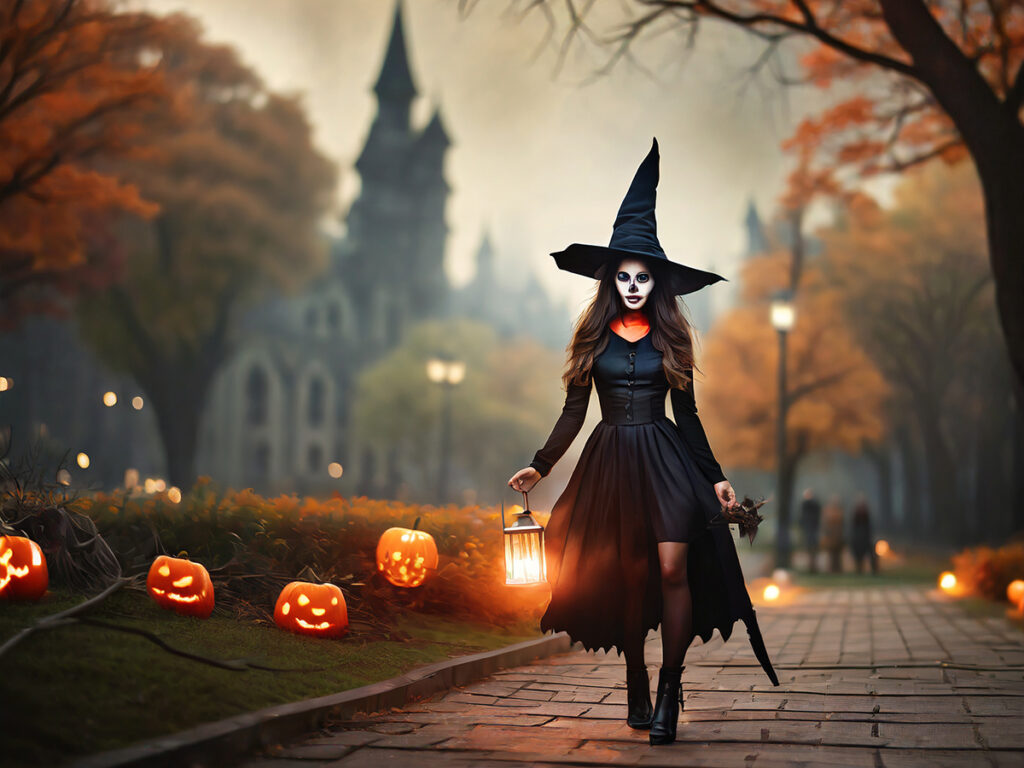What is Halloween? – Halloween is a popular holiday celebrated in many countries, primarily in the Western world, on the night of October 31st. It has a rich and diverse history, and it is often associated with various customs and traditions. Halloween can be characterized by the following key elements:
- Costumes: One of the most recognizable aspects of Halloween is the tradition of dressing up in costumes. People of all ages, particularly children, don costumes of various characters, monsters, animals, or creative figures. This tradition is thought to have originated from the idea of disguising oneself from wandering spirits during the ancient Celtic festival of Samhain.
- Trick-or-Treating: Children go door-to-door in their neighborhoods, often accompanied by adults, in a tradition known as “trick-or-treating.” They receive candy and other treats from households that have decorated their homes for Halloween. The phrase “trick or treat” implies that, if a treat is not given, the child may play a harmless prank.
- Decorations: Many people decorate their homes and yards with Halloween-themed decorations, including carved pumpkins, known as Jack-o’-lanterns, cobwebs, witches, skeletons, and other spooky or eerie elements.
- Jack-o’-Lanterns: Carving pumpkins and placing candles inside them is a well-known Halloween tradition. The practice is believed to have originated from Irish folklore about a character named Stingy Jack, who was said to roam the Earth with a carved-out turnip as a lantern.
- Haunted Houses and Attractions: During the Halloween season, many communities and theme parks set up haunted houses and attractions where visitors can experience frightful and immersive encounters.
- Parties: Halloween is a time for costume parties and gatherings. People often come together to celebrate, socialize, and enjoy the festivities.
- Candy: The distribution and consumption of candy are central to Halloween. It’s a time when children and adults alike indulge in sweets and treats.
- Superstitions and Folklore: Halloween is associated with various superstitions and folklore, such as the belief that the boundary between the living and the dead is blurred on this night, or that it is a time for divination and fortune-telling games.
- Horror and Spooky Themes: Many people enjoy watching horror movies, reading spooky stories, or engaging in activities that embrace the eerie and supernatural aspects of the holiday.
The origins of Halloween can be traced back to ancient Celtic festivals, particularly the festival of Samhain, which marked the end of the harvest season and the beginning of winter. Over the centuries, Halloween has incorporated elements from Christian traditions, folklore, and various cultural influences.
Today, Halloween is a widely celebrated holiday that offers a mix of fun, creativity, and a touch of the supernatural, making it a beloved and highly anticipated time of the year for many people.

Is Halloween the devil’s holiday?
Halloween is not inherently a “devil’s holiday.” The holiday has a complex history with a blend of different cultural and religious influences. While it does have some elements that may be considered spooky or related to the supernatural, it is not a celebration of the devil or Satan.
The association of Halloween with the devil or evil can be traced to misconceptions and misconceptions about its origins and practices. Some people may perceive Halloween as a time for occult or sinister activities, but for most, it is a lighthearted and enjoyable holiday focused on dressing up in costumes, community events, and, for children, trick-or-treating.
As mentioned earlier, Halloween has Christian origins as All Hallows’ Eve, a time to prepare for the Christian holidays of All Saints’ Day and All Souls’ Day. In various cultures, it has also incorporated elements from ancient Celtic and pagan festivals, such as Samhain. These historical connections to the supernatural and the dead have contributed to the perception of Halloween as a time for spooky or eerie themes.
However, the way Halloween is celebrated varies widely, and many people view it as a secular holiday that is about fun, creativity, and community rather than any association with the devil. Ultimately, how Halloween is perceived and celebrated is a matter of individual belief and cultural interpretation. It’s important to recognize that people may have different views and approaches to the holiday, but it is not universally considered a “devil’s holiday.”